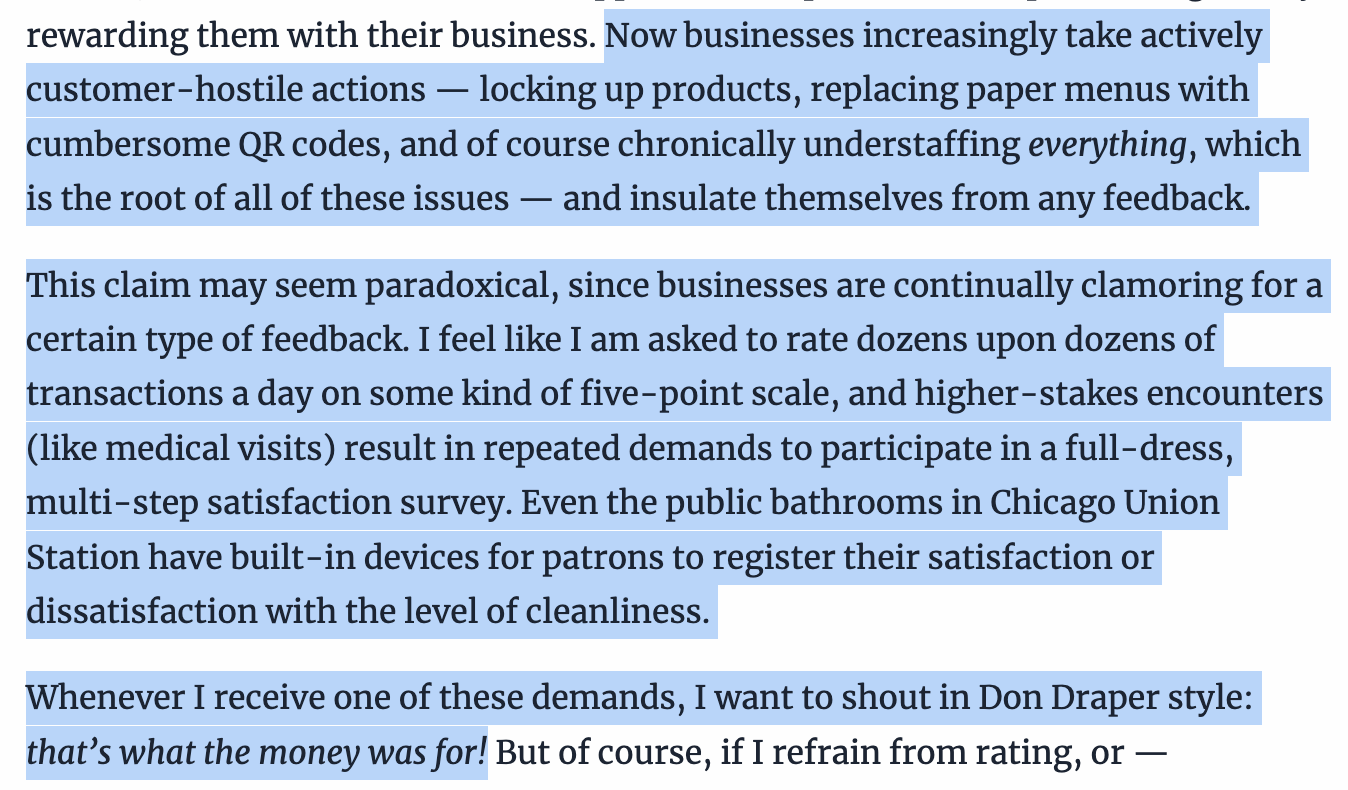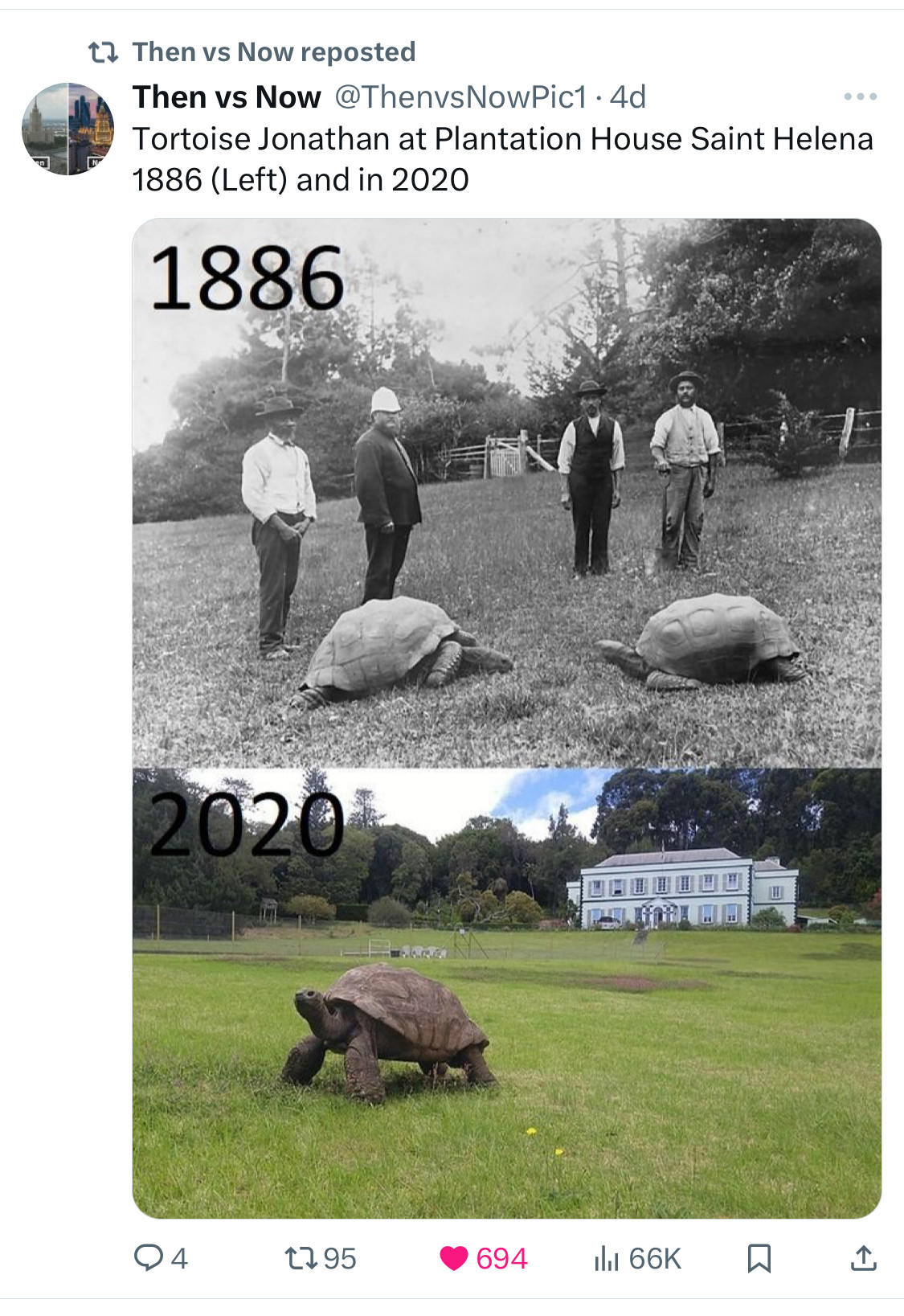@stevendbrewer it’s a better guess than i have. that’s a good description of how it moves! i’d never encountered thrips before your reply, so i can’t be too certain either way.
@realcaseyrollins i mean it's my leg, so, no.
@stevendbrewer maybe! though it seemed a bit more antlike than the images of thrips i’m finding. it seemed like an ant in a garden hose somehow. https://zirk.us/@interfluidity/112629590627308045
@nev @artcollisions it was too dark to get a good still. they're all blurry. the thing was vaguely ant-like, but it was cylindrical, i.e. rather than having defined separate head, thorax, abdomen it was like it was in a cylindrical sheath.
what kind of creature is this?
[tech notebook] HTML iconography https://tech.interfluidity.com/2024/06/16/html-iconography/index.html
@KevinCarson1 if you do, i'd hope he would leave you a tip.
it was you and me against the world. but then the world won, and it was you and me against each other.
from a really fabulous, read-the-whole-thing essay by @adamkotsko on the increasing illegibility of what passes for capitalism these days. https://itself.blog/2024/06/15/what-is-the-economy-even-for/
 Text: Now businesses increasingly take actively customer-hostile actions — locking up products, replacing paper menus with cumbersome QR codes, and of course chronically understaffing everything, which is the root of all of these issues — and insulate themselves from any feedback. This claim may seem paradoxical, since businesses are continually clamoring for a certain type of feedback. I feel like I am asked to rate dozens upon dozens of transactions a day on some kind of five-point scale, and higher-stakes encounters (like medical visits) result in repeated demands to participate in a full-dress, multi-step satisfaction survey. Even the public bathrooms in Chicago Union Station have built-in devices for patrons to register their satisfaction or dissatisfaction with the level of cleanliness. Whenever I receive one of these demands, I want to shout in Don Draper style: that’s what the money was for!
Text: Now businesses increasingly take actively customer-hostile actions — locking up products, replacing paper menus with cumbersome QR codes, and of course chronically understaffing everything, which is the root of all of these issues — and insulate themselves from any feedback. This claim may seem paradoxical, since businesses are continually clamoring for a certain type of feedback. I feel like I am asked to rate dozens upon dozens of transactions a day on some kind of five-point scale, and higher-stakes encounters (like medical visits) result in repeated demands to participate in a full-dress, multi-step satisfaction survey. Even the public bathrooms in Chicago Union Station have built-in devices for patrons to register their satisfaction or dissatisfaction with the level of cleanliness. Whenever I receive one of these demands, I want to shout in Don Draper style: that’s what the money was for!
plutocrats building apocalypse bunkers is maybe a great example of the iron law of institutions.
@sqrtminusone@emacs.ch i mean i hope it doesn't... but it's a pitch.
@sqrtminusone@emacs.ch here's a screenshot, the beginning of the first e-mail in my original post. ("First Name" is redacted in green, 'cuz there's a lot of red built in.)
 Cleaned-up text from screenshot: FROM THE DESK OF Lara Trump YOU MEAN THE WORLD TO US! I really mean that. You never left President Trump’s side. Loyalty is huge in the Trump family, especially to my father-in-law. So please, I need you to take your support to the next level: SIGN THE PETITION TO STAND WITH TRUMP Without MAGA standing by his side, Donald J. Trump would have been destroyed by the Biden Regime. But there’s one thing | know about my father-in-law: He has felt your support through every single Indictment, Hoax, Raid, Arrest, and Witch Hunt... So right now before the clock strikes midnight PLEASE STAND WITH TRUMP BEFORE IT’S TOO LATE!
Cleaned-up text from screenshot: FROM THE DESK OF Lara Trump YOU MEAN THE WORLD TO US! I really mean that. You never left President Trump’s side. Loyalty is huge in the Trump family, especially to my father-in-law. So please, I need you to take your support to the next level: SIGN THE PETITION TO STAND WITH TRUMP Without MAGA standing by his side, Donald J. Trump would have been destroyed by the Biden Regime. But there’s one thing | know about my father-in-law: He has felt your support through every single Indictment, Hoax, Raid, Arrest, and Witch Hunt... So right now before the clock strikes midnight PLEASE STAND WITH TRUMP BEFORE IT’S TOO LATE!
@SteveRoth not a pitch i love tbh!
@SteveRoth (i think that there was a "the fuhrer loves you" vibe among "good germans", but i don't recall where i have gotten that impression and certainly stand ready to be corrected.)
A person who would also be 'swaldman' but with a different first name than me seems accidentally to have signed up an email address that's mine to Trump mailing lists.
I've found it fascinating. The public conversation from Trump is all resentment and grievance, but the inside pitch to supporters is "I love you, I chose you, I need you" It's about making the supporter feel special, essential, part of the family.
I've redacted the S-beginning first name that isn't mine.
 Screnshot of e-mails from the last few days, transcribed here as
Screnshot of e-mails from the last few days, transcribed here as
we are all the hare.
@realcaseyrollins funding the government is just regulating demand. the government doesn’t need cash — it is the source of that. but if it just prints cash, there’s too much demand and thus inflation. thus one important role of taxation is to regulate demand, to make sure the cash it spends into the economy, along with other factors, don’t undermine the real value of the money it prints. i agree with you that taxes like sales or value-added taxes are one good way to do that.
@realcaseyrollins taxes have different purposes. a sales tax helps regulate demand. the main point of the income tax, though it has been enfeebled first by Kennedy, then by Reagan, is to regulate the income distribution. progressive is its very point.
@realcaseyrollins very progressive, especially at the high end.
we think of dracula as this bad guy, but among his kind he is revered for offering a product that is organic, ethically-sourced, free-range.


